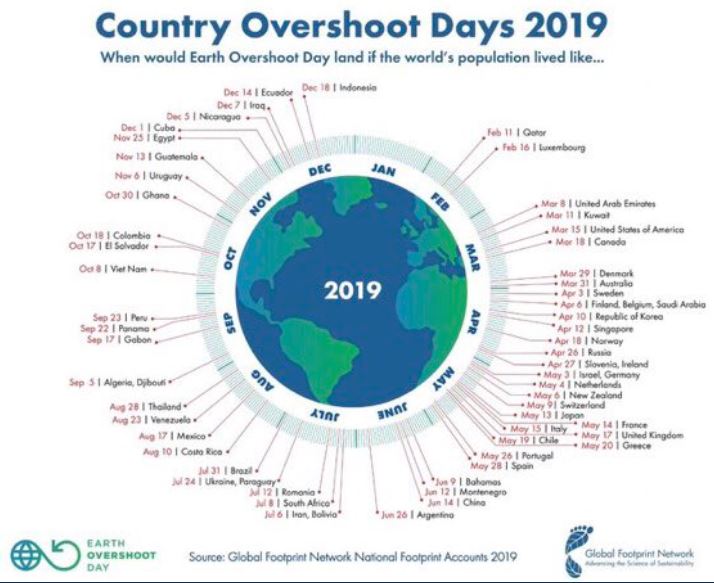Starting Today, We Are Borrowing From the Future. This Is How

On July 29, humanity used nature’s resource budget for the entire year, according to Global Footprint Network, an international sustainability organization that has pioneered the Ecological Footprint. It was Earth Overshoot Day. The date has moved up two months over the past 20 years to the 29th of July this year, the earliest date ever.
Earth Overshoot Day falling on July 29th means that humanity is currently using nature 1.75 times faster than our planet’s ecosystems can regenerate. This is akin to using 1.75 Earths.
Overshoot is possible because we are depleting our natural capital – which compromises humanity’s future resource security. The costs of this global ecological overspending are becoming increasingly evident in the form of deforestation, soil erosion, biodiversity loss, or the buildup of carbon dioxide in the atmosphere. The latter leads to climate change and more frequent extreme weather events.

“We have only got one Earth – this is the ultimately defining context for human existence. We can’t use 1.75 without destructive consequences,” said Mathis Wackernagel, co-inventor of Ecological Footprint accounting and founder of Global Footprint Network.
With Earth Overshoot Day occurring ever earlier in the year, and a big part of it being the growing amounts of CO2 emissions, the importance of decisive action is becoming ever more evident. For this reason, we are working with all parties to find effective approaches,” said María Carolina Schmidt ZaldívarMinister of Environment, Chile, and chair of the Climate COP25 scheduled this December in Santiago de Chile.
Moving the date of Earth Overshoot Day back 5 days each year would allow humanity to reach one-planet compatibility before 2050. Solutions that #MoveTheDate are available and financially advantageous, according to the network. Significant opportunities are to be found in five key areas: cities, energy, food, population, and planet. For instance, cutting CO2emissions from fossil fuel burning by 50% would #MoveTheDate by 93 days.
Christiana Figueres, the former Executive Secretary of the United Nations Framework Convention on Climate Change (UNFCCC), Bertrand Piccard, founder of the Solar Impulse Foundation, and Sandrine Dixson-Declѐve, co-president of the Club of Rome, are among those who took to Twitter in recent weeks, calling to #MoveTheDate in video statements.
Just days ahead of Earth Overshoot Day, Global Footprint Network launched the beta version of the #MoveTheDate Solutions Map where people are invited to champion existing solutions. Users can also connect with each other on the basis of geography and focus of interest, accelerating the implementation of new projects in the real world. Developed with startup Mapotic, the social platform also features solutions identified by partners, starting with Buckminster Fuller Institute award laureates.
The #MoveTheDate Solutions Map is designed to complement the Footprint Calculator. The latter, which enables people to calculate their own Ecological Footprint and their personal Earth Overshoot Day, draws more than 2.5 million users per year and is now available in eight languages, with Chinese and Portuguese most recently added.
For India, with its compelling requirement to meet the basic expectations of its large population which is still deprived of basic needs , while the per capita levels area cause for satisfaction, sheer numbers makes it imperative that we conserve passionately, and demand a bigger effort from the ‘richer’ countries to exceed every effort of ours. Which, of course, is another story.




